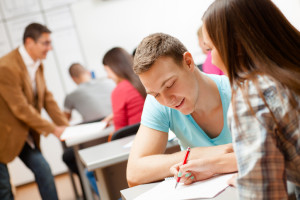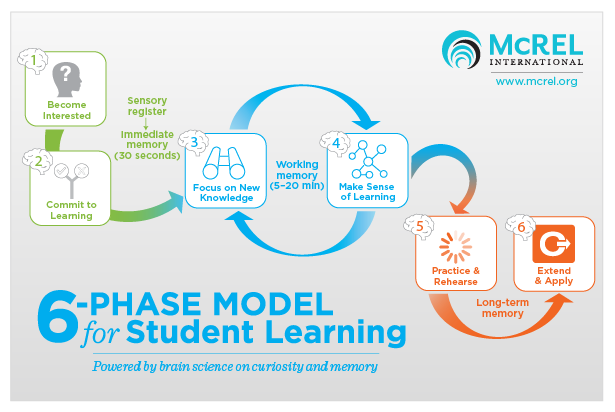Ever since we articulated McREL’s six-phase model for student learning in our April 2018 white paper, Student Learning That Works: How Brain Science Informs a Student Learning Model, I’ve been having great fun talking about it with thousands of educators at conferences and workshops around the world, sharing instructional strategies and classroom practices that support each phase. (Learn more about the model in the spring 2018 issue of Changing Schools magazine and this October 2018 blog post.)
McREL Six-Phase Model for Student Learning
The purpose of the model is to remind us all that the goal of school isn’t teaching, it’s learning. This hasn’t been news to any of the educators I’ve interacted with. What is new is seeing the entire learning process—from disconnected data points to a robust plan for ongoing personal growth, mediated by known science on neurological and psychological processes—described in a unified model for student learning. Teachers often tell me they’ve been doing many of the strategies we endorse, yet have never before had an opportunity to think about why they work or how to sequence them in a cohesive manner (or how to tweak them to work even better for the precise mix of students in their class). In other words, they’ve long had a good toolkit and materials but often lacked the blueprints, and you need both to build a sound house.
At these workshops and sessions, somebody in the room also frequently asks: “Should we share this model with our students?”
Please do! We all want to progress from the stodgy, traditional teacher-owned, student-experienced classroom to one where learning is student-owned and teacher-guided. It stands to reason that if teachers benefit from knowing how students learn, then students will, too. Learning shouldn’t be something that’s done to students, but by them. The more engagement and participation we can spur them to, the better. And that absolutely includes the idea of getting students thinking about their thinking.
Does a room full of 25 or 30 children or teenagers who all think they’re in charge of their own learning sound a bit chaotic? It sure can be, which is why classroom teachers will always have an indispensable role as a learning facilitator, guide, and mentor for their students.
When you judge that the timing is right because your students have bought into the idea of taking ownership of their learning, then showing students the benefits of “going meta” with their thinking would be an invaluable gift.



